Since the Abidjan Principles were adopted by a group of 57 global education and human rights experts, they are quickly gaining recognition and momentum. The Abidjan Principles are emerging as a game-changing tool for States striving to comply with their human rights obligations and for those who wish to hold States accountable.
Since their adoption, they have been recognised by the main eight U.N. and regional human rights institutions and mandate-holders working on the right to education.
UN special Rapporteur on the right to education
The UN Special Rapporteur, Farida Shaheed, has referred to the Abidjan Principles in both of her reports published to date, on the Roles and Rights of Teachers; and Securing the Right to Education: advances and challenges.
UN HUman Rights Council
In resolution A/HRC/53/L.10 of July 2023, the Abidjan Principles are again recognised by the UN Human Rights Council
UN human Rights Council
During the 52nd session of the UN Human Rrights Council, a joint statement on academic freedom which references the Abidjan Principles was delivered by France on behalf of 72 countries.
UNESCO: TAshkent Declaration
The Tashkent Declaration was adopted during the UNESCO World Conference on Early Childhood Care and Education. It references the Abidjan Principles.
November 2022
GENERAL COMMENT 7: STATE OBLIGATIONS UNDER THE AFRICAN CHARTER ON HUMAN AND PEOPLES’ RIGHTS IN THE CONTEXT OF PRIVATE PROVISION OF SOCIAL SERVICES
Adopted during the 72th Ordinary Session of the African Commission on Human and Peoples’ Rights on 28 July 2022 in Banjul, The Gambia
From rhetoric to practice
Worldwide recognition and use of the Abidjan Principles on the right to education
INTER-AMERICAN COMMISSION ON HUMAN RIGHTS
The Inter-American Commission on Human Rights (IACHR) issued a Declaration of Inter-American Principles on Academic Freedom and University Autonomy recognising the Abidjan Principles as one of its reference texts.
December 2021
HUMAN RIGHTS COUNCIL
The United Nations Human Rights Council adopted a resolution on the right to education that recognized the Abidjan Principles for the second time and further called on UN agencies to work with the GPE and civil society to provide technical support to States to realise the right to education in the COVID-19 and post-COVID context.
July 2021
EUROPEAN COMMITTEE OF SOCIAL RIGHTS
The Committee recognised the Abidjan Principles in an important statement, that also recognises one of the important contributions of the Principles, States’ obligations towards public education.
April 2020
AFRICAn
COMMISSION ON HUMAN AND PEOPLE’S RIGHTS
The ACHPR recognised the Abidjan Principles in a second resolution: Resolution on the Need to Develop Norms on States’ Obligations to Regulate Private Actors Involved in the Provision of Social Services (ACHPR/Res. 434 (EXT.OS/ XXVI1) 2020).
March 2020
Independent Expert on the effect of foreign debt and other related international financial obligations of States on the full enjoyment of human rights
A new report on private debt and human rights recognises the Abidjan Principles (A/HRC/43/45 para.26).
January 2020
Special Rapporteurship on Economic, Social, Cultural and Environmental Rights of the Organisation of American States (OAS)
In a new report, the Abidjan Principles on the right to education were recognised as a ‘valuable specialised source of interpretation’ of State obligations with regard to the right to education within the framework of the Inter-American system (para. 227).
January 2020
paris Peace Forum
The Paris Peace Forum selected the Abidjan Principles as one of the ten ‘most promising governance projects’ that will be awarded support to scale-up.
November 2019
Office of the high commissioner for human rights
At the United Nations Social Forum 2019, the United Nations High Commissioner for Human Rights, Ms Michelle Bachelet, welcomed the Abidjan Principles while emphasising that the principle of public education must be upheld.
October 2019
United Nations Human Rights Council
The United Nations Human Rights Council adopted a resolution on the right to education that recognised the Abidjan Principles (p.2).
July 2019
The
UN Special Rapporteur on the right to education, Dr Boly Barry
In a report to the Human Rights Council, the UN Special Rapporteur on the right to education provided an analysis of the Sustainable Development Goal 4 on the right to education in accordance with the Abidjan Principles (A/HRC/41/37).
July 2019
Global Partnership for Education
The GPE private sector strategy recognised the Abidjan Principles stating that ‘no GPE funds can be used to support for-profit provision of core education services’ (p.11).
June 2019
African Commission on Human and Peoples’ Rights
A resolution on States’ Obligation to Regulate Private Actors Involved in the Provision of Health and Education Services recognised the Abidjan Principles by referring to the overarching principle No. 5 (ACHPR / Res. 420 (LXIV) 2019).
June 2019
International Human Rights Law Review
The Abidjan Principles were published in full in the June 2019, Volume 8 - Issue 1 of the International Human Rights Law Review.
June 2019
Judges talk about the Abidjan Principles on the right to education during a series of webinars that took place in July 2020:




















